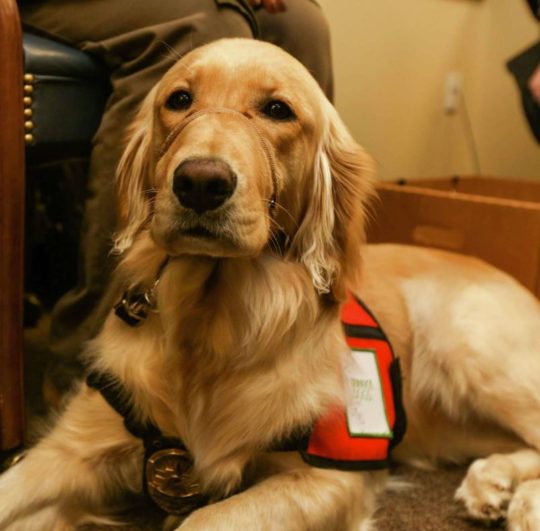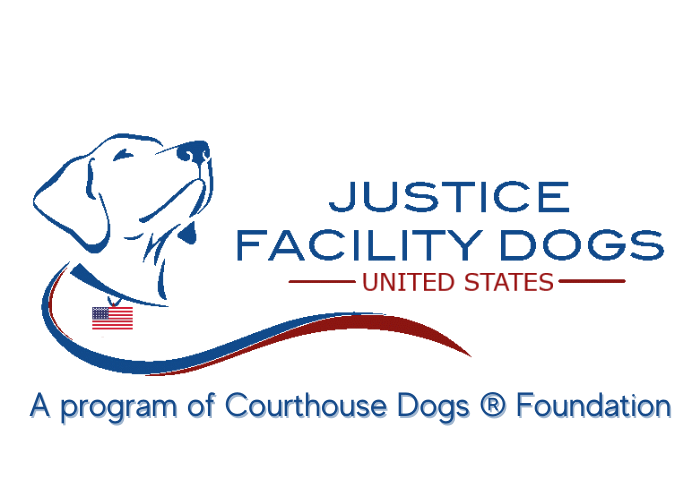 Justice Facility Dogs in Texas
Justice Facility Dogs in Texas
Michelle Cobern
Texas State Coordinator
Justice Facility Dogs US
These agencies have professional handlers working with certified facility dogs in Texas.
CASA of Cameron and Willacy Counties, Brownsville (CCI)
Child Protection Center, Austin (ADW)
Coryell County District Attorney, Gatesville (Patriot Paws)
Ellis County Children’s Advocacy Center, Waxahachie (CCI)
Ellis County District Attorney, Waxahachie (CCI)
Family Advocacy Center, Irving (CCI)
Irving Police Department Family Advocacy Center, Irving (CCI)
Martin House Children’s Advocacy Center, Longview (CCI)
Montgomery County District Attorney, Conroe (Service Dogs, Inc.)
Nacogdoches County District Attorney, Nacogdoches (CCI)
Parker County Attorney’s Office, Weatherford (Service Dogs, Inc.)
Phoenix Center, Marble Falls (CCI)
Scotty’s House Child Advocacy Center, Bryan (CCI)
Smith County District Attorney, Tyler (CCI)
Texas CASA (CCI)

Facility dog Sumi, trained by Service Dogs, Inc.
Appellate Court Decisions
Lambeth v State of Texas (2017)
Lambeth v. State, 523 S.W.3d 244 (2017)
Full text of the opinion here.
A trial court convicted appellant Ben Charles Lambeth of continuous sexual abuse of a child and aggravated sexual assault against a child, with concurrent sentenced of 30 and 20 years. The trial court allowed the complaining witness to testify with a service dog in the witness box, out of the jury’s sight, as a comfort item. Appellant raised two issues on appeal: That the trial court erred by allowing the service dog, and the trial court should have excluded testimony from appellant’s former step-daughter that he repeatedly sexually assaulted her as a minor. On the service dog issue, the court found that the trial court properly made findings of fact as required by Tex. Code Crim. Proc. art. 38.074 §3(b), which governs comfort items.
Specifically, the trial court found the witness’ testimony would be more reliable with the dog, and that the dog was brought into the court outside the jury’s presence. The court overruled appellant’s argument that the dog alerted the jury to its presences by making sounds during testimony, thereby prejudicing the jury. The court found that the record did not establish what sounds, if any, the dog made. The court also found that the jury would not have been prejudiced even if it had known about the dog.
Appellant argued that the jury was prejudiced because it could have inferred the witness suffered a psychological injury based on her use of the dog, but the court found that direct evidence established the witness suffered a psychological injury from sexual abuse, and thus any inference regarding the dog was inconsequential.
The court affirmed the trial court’s judgment.
Smith v. State (2016)
2016 WL 1444143 (2016)
Full text of the opnion here.
Texas Court of Appeals, 14th District, April 12, 2016
Petition for discretionary review filed July 14, 2016
Nature of Case:
Jonas Smith was convicted of aggravated assault, for stabbing a woman that he was dating with a butcher knife. The victim’s 10-year-old son saw her shortly after the assault.
Procedure in trial court:
Prior to trial, the prosecutor asked the judge for permission to use a service dog during the son’s testimony. The prosecutor explained that this would “promote the child’s comfort and anxiety and mental well-being while they’re in the scary setting of the courtroom.” Defense counsel objected that use of the dog would be “overly prejudicial.” The court overruled that objection.
During trial, the child was seated in the witness stand with the dog at his feet before the jury was brought in. The handler was seated nearby. After the child testified, the jury was excused before the dog left the courtroom.
Jury Instructions:
No special instruction relating to the dog was given.
Appellate Decision:
The only objection raised by defense counsel at trial was that use of the dog would be “overly prejudicial.” The appellate court’s review was therefore limited to that issue. Because the dog was positioned so that he could not be seen by the jury, the trial judge properly found that the dog’s presence was not prejudicial.
Alternatively, any error in allowing the dog was harmless. The jury did not see the dog, so they could not have been influenced by the dog’s presence. Even if the jury saw the dog and felt sympathy for the child, that would not have influenced the verdict. The child did not see the assault and did not know who committed it.
ADI Accredited Organizations
The following organizations place facility dogs in the state of Texas. Please visit their websites to find out more about each organization.
ADW – Assistance Dogs of the West

